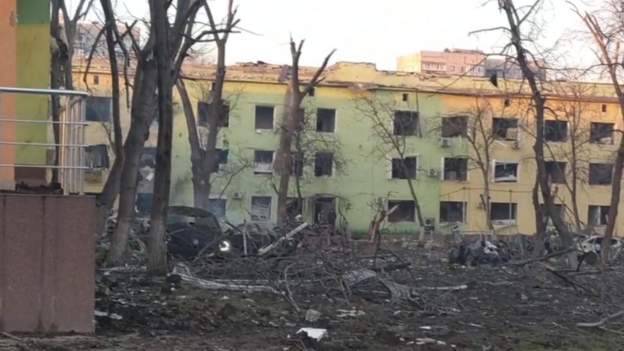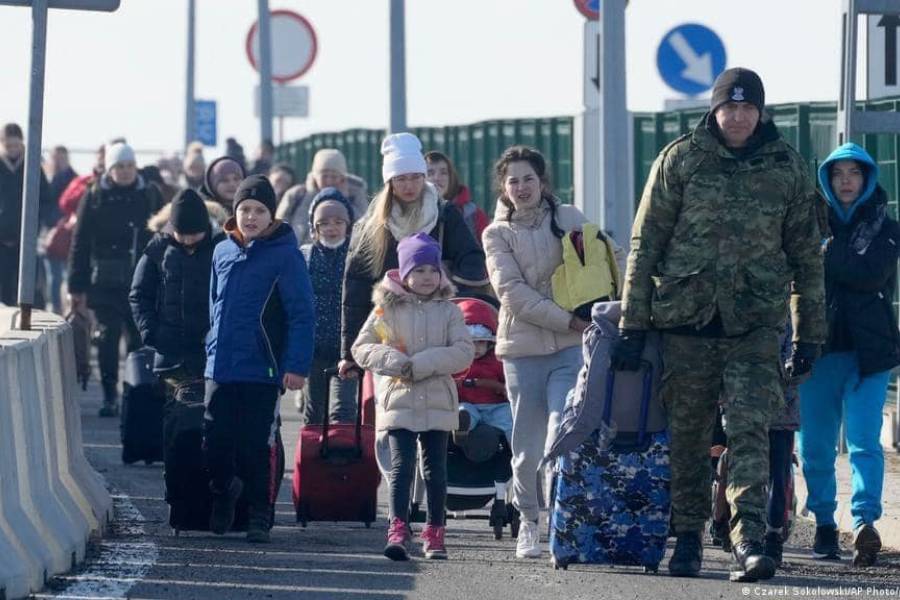The attacks on health care facilities in Ukraine began the first day of the war, when a bomb blew up outside a hospital in Vuhledar on Feb. 24, killing four people and injuring 10. By mid-March, with at least 636 Ukrainians dead—a count many fear is vastly underestimated—and nearly 3 million refugees pouring over the country's borders, according to the UN, the list of attacks on health care facilities, vehicles, and workers had grown to 31 confirmed by the World Health Organization, one of the worst being the bombing of a maternity hospital in the besieged city of Mariupol.
While the Russians claimed Ukrainian military forces were stationed there, on-the-ground reporting told a different story: children buried under rubble, three patients dead, and 17 people—including at least one woman in labor—injured, all forced to flee the hospital and find refuge in a city cut off from food and water. Less than a week later, it was reported that the laboring woman and her baby died in the aftermath.

Image caption: A hospital in Mariupol, Ukraine, was destroyed March 9
Image credit: Wikimedia Commons
"This is a war crime and an act of terror meant to force the Ukrainians to surrender," Chris Beyrer, the Desmond M. Tutu Professor of Public Health and Human Rights at the Johns Hopkins Bloomberg School of Public Health, says of the Mariupol attack. He and two other Hopkins experts say that attacks on health care are not only part of Vladimir Putin's wartime playbook, but have compounded a humanitarian crisis which, in coming weeks, could involve the spread of COVID-19 and other infectious diseases.
While the crisis was set in motion by war, the experts say Putin's strategy of attacking both civilians and health care facilities is particularly egregious. "If you want people to move out of a city or a country, one way to do it is attack health systems because people won't want to stay when they can't get health care," says Paul Spiegel, professor in the Department of International Health at the Bloomberg School and director of the Center for Humanitarian Health. And the attacks, he points out, cause both short- and long-term damage: "You have fewer hospitals and fewer health care workers and, on top of that, particularly with ICUs and a limited oxygen supply, a lot of trauma patients and not enough spots to treat everyone."
Leonard Rubenstein, director of the Program on Human Rights, Health, and Conflict at the Bloomberg School, and author of the book Perilous Medicine: The Struggle to Protect Health Care from the Violence of War, adds that Putin's strategy of assaulting health systems is "very much a mode of attack that's completely contrary to a law that's been around for 150 years."
Rubenstein, also a core faculty member at the Johns Hopkins Berman Institute of Bioethics, refers to the Geneva Conventions, which, starting in 1864, established the legal parameters of wartime humanitarian treatment. Included, he says, is the intention to "protect and respect the wounded and sick, hospitals, ambulances, and health workers." The problem, he adds, is that multiple countries have broken the law in conflicts that precede and include World War I as well as wars in Korea, Vietnam, and El Salvador. Even today, in the Tigray region of Ethiopia, a civil war has decimated the health system. "The key is, over time, there has never been accountability for crimes involving attacks on health care," Rubenstein explains. "And here there may be an opportunity."
Putin's attack on health systems goes back to the Chechen War of 1999 to 2000, when Russian forces engaged in a brutal bombing campaign that razed entire cities. Fifteen years later, when Russia assisted Syria in fighting rebel forces, airstrikes once again leveled cities like Aleppo, killing civilians and destroying hospitals.
According to its website, the International Criminal Court, or ICC, is charged with prosecuting "the gravest crimes of concern to the international community: genocide, war crimes, crimes against humanity, and the crime of aggression". Chechnya and Syria, Rubenstein says, are not members of the ICC, so it didn't have jurisdiction in those cases. Ukraine, although not a member, has officially accepted ICC jurisdiction, "and the prosecutor is now investigating war crimes there," he says. If the process plays out, "it would be the first time there has been international prosecution of health care attacks," he adds.
After the Mariupol bombing, Rubenstein discussed the topic on the Bloomberg School's Public Health on Call podcast and penned an op-ed in Mother Jones decrying Russia's history with committing war crimes. While threat of prosecution probably won't sway Putin, it may have a chilling effect on his military aids, he suggests. And, long-term, Rubenstein writes, "a message can be sent to perpetrators: The horrors combatants inflict on hospitals, their staffs, and the patients who desperately need care will be punished."
Also see
Meanwhile, the war in Ukraine continues, prompting the biggest refugee crisis in Europe since World War II. As harrowing as the exodus has been, with humanitarian crises "you're also worried about infectious-disease outbreaks," says Spiegel, who's now in Poland working as an emergency coordinator for the refugee response for the World Health Organization. Among the possibilities: measles, tuberculosis, and typhus. Water-borne diseases, such as cholera and diarrhea, are also common when sanitation is unreliable.
Complicating matters is "vaccine hesitancy," Beyrer says. Because many countries in Eastern Europe were once under Soviet control, there's a general mistrust of government and their preferred medical treatments, including Russia's heavily promoted, yet scientifically challenged, COVID-19 vaccine, Sputnik V. The rate of those fully vaccinated in Ukraine, where there was an omicron surge prior to the war, is just 35%, and it's also low in nearby countries. "Millions are gathering in ways that are likely to accelerate COVID spread in places where it was already spreading and in populations on both sides of borders with low vaccine coverage," Beyrer says.
This medical warfare, too, may be part of Putin's playbook. Roughly 10 years ago, Beyrer helped run an HIV testing facility in Moscow, until anti-gay and anti-U.S. funding policies forced it to shut down. And in 2014, after Russia annexed the Ukraine territory of Crimea, "the first thing they did was stop all methadone treatment" for heroin addiction, a huge challenge in Ukraine, Beyrer says. Many patients returned to heroin and overdosed, while others committed suicide. Eventually, buses were brought in to take patients to western Ukraine for continued therapy. But if Russia occupies Ukraine, Putin "will stop methadone treatment very quickly," Beyrer warns. "He will also go after public health programs for LGBT populations. Ukraine has been a leader in testing and treatment for HIV in gay-bisexual men. That will instantly be stopped."
As dire as the situation appears, all three experts are inspired by the Ukrainian people's resistance, and Beyrer, in particular, is not surprised. He visited Kyiv, Ukraine's capitol city, back in 2017, when he read a newspaper article about the ongoing conflict—begun in 2014, after Crimea was annexed—between Ukrainian and pro-Russian separatist forces in eastern Ukraine. Conflict with Russia, he adds, stretches way back, to the early 1930s, when Soviet leader Joseph Stalin seized Ukrainian food, causing a famine that killed almost four million. "The Ukrainians have experienced a Russian genocide already," Beyrer says. "They know what that looks like, and I think that's a part of the fierceness of their resistance."
Posted in Voices+Opinion, Politics+Society
Tagged chris beyrer, ukraine, refugees, leonard rubenstein, paul spiegel









